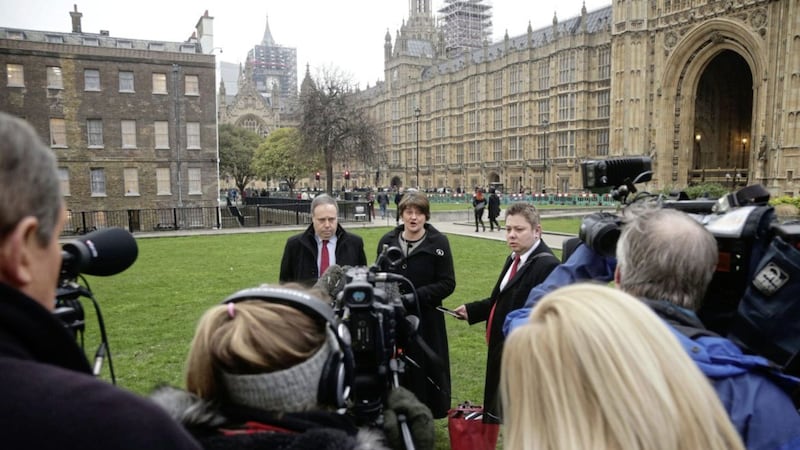IT was heartening to read the editorial in this Monday’s Irish News, headlined: “Progress made despite breakdown in negotiations”.
Too many people have lost perspective after last week’s unionist wobble.
The draft agreement between the DUP and Sinn Féin – which is exactly what it was, regardless of hair-splitting over the meaning of ‘draft’ and ‘agreement’ – represents significant progress.
The meaning of ‘progress’ in this instance relates to DUP talks negotiator Simon Hamilton’s statement last July that Sinn Féin cannot “demand a ten-nil win.”
From what is known of last week’s deal, it looks more like a one-all draw. Most items on the talks agenda have simply melted away. RHI and Arlene Foster’s return as first minister – Sinn Féin’s original red lines – are no longer mentioned. Legacy and a bill of rights are to be kicked into further committees, although both have already been subject to a decade of deliberations, which in legacy’s case keep on arriving at the same conclusions, while the bill of rights just turned into an academic farce.
Same-sex marriage has apparently been abandoned. On that point, Sinn Féin must be happy enough to let the DUP continue disgracing itself before British mainstream opinion. The petition of concern will not be reformed. The DUP does not want to lose it and Sinn Féin may feel it is only one possibly imminent election away from being able to raise petitions on its own.
The big win for republicans is an Irish language act, yet activist demands have been substantially watered down. There will be no public sector recruitment quotas – the one unquestionably legitimate unionist concern.
Bilingual signage has been fudged, Irish in the courts will be permitted but not required and the language commissioner will be more of an ombudsman, with no powers of compulsion – let alone prosecution.
In practice, this is little more protection than Irish has already.
The DUP conceded the principle of Irish language legislation after last March’s assembly election and initially thought it could balance it with Ulster-Scots or ‘cultural’ provisions. That survives in last week’s deal but only as a face-saving exercise. Soundings last autumn quickly revealed to the DUP that its supporters were not buying Ulster-Scots as a consolation prize.
So the DUP sought a better prize – a guarantee that future Sinn Féin walk-outs would not collapse the executive.
It has obtained this but again the demand has been substantially watered down, to a six-week cooling off period to resolve Stormont rows. If a party is determined to bring down the executive, waiting six weeks will make little difference.
The real win for unionism is proof that Sinn Féin is genuinely committed to restoring devolution, something that had been in serious doubt.
The DUP has instantly snatched defeat from the jaws of this victory by making itself the obstacle to a deal. A cynic might see this as the ultimate one-all draw, as it means both parties will be equally crestfallen when they slink back into Stormont, in contrast to the Pyrrhic victory of the Fresh Start agreement, where Sinn Féin clearly suffered a ten-nil loss.
Selling a return to what is frankly the status quo will still be difficult for republicans. Perhaps the reason Sinn Féin president Mary Lou McDonald ended her inaugural speech two weeks ago with “Up the rebels” and “Tiocfaidh ár lá” is that she thought she would be offering her party a hill of magic beans less than 24 hours later.
If so, that only highlights the DUP’s cowardice in not confronting its base. It has known for almost a year that Irish language legislation was inevitable and known since autumn that Ulster-Scots would not balance it out. It needed to sell the overall package.
The deal could not have been sunk in a weekend by a handful of scare stories if there had been any preparation on the ground.
Unfortunately, while there is no excuse for this ill-preparedness, there is a reason for it intrinsic to the deal-making process.
What trust has built up between the DUP and Sinn Féin over the past year has been due to the confidentiality of their negotiations. Talks have been almost watertight – occasional statements like that from Hamilton, or the promotion of Ulster-Scots before last autumn, have revealed the outline of what was being discussed.
This secrecy produced an agreement but also stopped the DUP from walking its supporters through each compromise.
When talks resume, a more open process is required.









